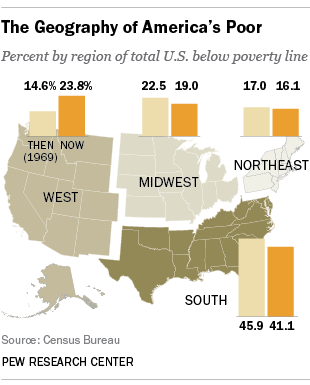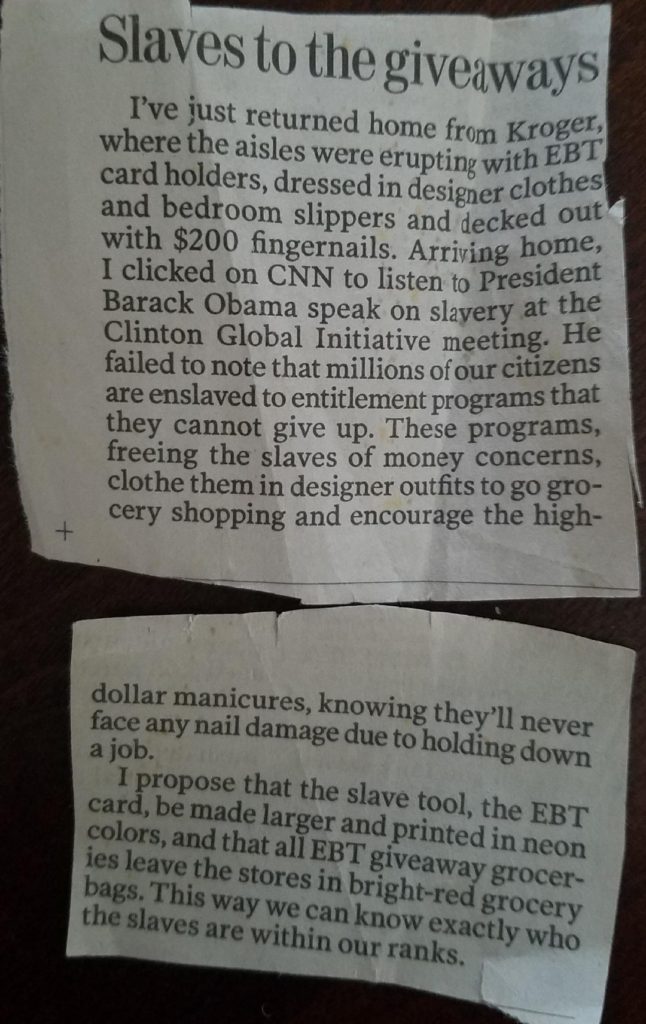According to an article written by Michelle Lee, “The American Economy of the 60s and 70s”, during the 1960’s, the government struggled to slow inflation and stabilize the economy. When President Johnson came into office, he implemented the Great Society of the 1960’s. The Vietnam War and the War on Poverty were top priorities. The government increased their spending to fund these programs. Under his leadership, Medicare and Medicaid were established. Money was appropriated to improve public education. The Office of Economic Opportunity was created to provide job training for the poor. Many people were critical of these necessary programs because they resulted in federal expenditures in the billions. At the end of the Vietnam War in the 1970’s, the inflation rates were high and the energy crisis created a huge economic recession.
People wanted jobs that paid living wages with benefits, fair and stable housing and desegregated schools. Some white and wealthy black people were of the opinion that their hard earned tax dollars were being used to take care of irresponsible black and poor people. People normally vote where their interests are. I thought people should vote for what was best for everyone. I was too young to vote but was interested in the issues and made a mental note of the list of priorities. Sadly, the priorities have not changed much.
Over 51 years after the Poor People’s Campaign in Washington, D.C., poverty remains a major concern. The needle has barely changed. There are many studies done and articles written about the reason. According to Pew Research Center, nearly half of the population can’t pay basic living expenses. Over a million people are poor or low income. Approximately one third of the people live in the south. According to the 2015 map below, the poverty rate increased in the West since 1969. There are many reasons listed why people are living in poverty. Research supports that a large majority of people feel working hard is the way out of poverty. There is a laundry list of other reasons. Leveling the playing field is one of the major steps out of poverty.

Data from Pew Research Center indicate that large racial gaps persist in areas like wealth and poverty. In 2015, the median household income for black people was $44,100 compared to $75,000 for white people. Americans, regardless of race, rely on jobs and fair wages to lift them out of poverty. Household incomes fell further below the federal poverty line. For decades, politicians have argued for and against anti-poverty programs. Some feel these programs lifted people out of poverty and others feel these programs trap people in a cycle of dependency. Research indicates that the majority of people living in poverty are children younger than eighteen.
According to an article by Drew Desilver, “Who’s Poor in America? 50 years into the War on Poverty; a data portrait”, the poverty rate in the south was the highest among all four regions. Unemployment, low wages and insufficient benefits are leading causes. Delsiver wrote “The War on Poverty was the most ambitious domestic policy initiative since the Great Depression.” Based on 2017 data, the poverty rate is around 12.3%. This means approximately 39 million Americans are still living in poverty and around 18.5% lived in deep poverty.
I found an article on the College of Mount Saint Vincent’s Website entitled “Society or the Individual: Root Causes of Poverty in America” especially compelling. According to research, approximately three thirds of the public describe poverty as important issues. Approximately forty percent say they are interested in helping find a solution, but only a third say they have personally tried to help the poor. The articles goes on to say that nearly sixty percent feel poverty is the basis of an unequal society. The other forty percent say a lack of effort on the part of the individual is to blame. This article breaks down percentages based on party affiliation, gender, and age. More than two thirds of poor people say poverty is the product of society.
According to an article by Eric Jensen, “Teaching with Poverty in Mind” the effects of poverty can be emotional and social. Poor children are disproportionately exposed to adverse social and physical conditions. They spend less time finding out about the world around them and spend more time struggling to survive within it. They have less supportive networks and as adolescents, are more likely to rely on peers than adults. This cycle leads to crime, incarceration, alcohol and other drug abuse, violence, abuse and other unhealthy behaviors. People living in poverty are more likely to lead less healthy and shorter lives.
The many articles I read support that poverty is a multifaceted issue that exists based on the interplay between many root causes. It may be individual or systemic, sometimes called structural. Individual poverty may be attributed to behavior and life choices. Systemic or structural poverty may be beyond the person’s control. An example of this is the economy. Another key factor in the cycle of poverty is lack of education or access to education. Without some form of education, poor people may face difficulties in the labor markets. Jobs that require a higher quality education, skill set, or trade that pays better wages may be beyond reach. These factors create barriers for those in need of better opportunities. In turn, this perpetuates the cycle of poverty.
Finally, according to a blog written by MartinYim, “The Root Causes of Poverty”, the author wrote that political strife plays an important role in the manifestation of poverty. Insufficient labor rights and discrimination are also root causes. These social injustices perpetuates the cycle of poverty. When the country is divided, violence and corruption may result. People are trying to live day to day by any means necessary.
Yim wrote, “Poverty is the result of insufficient opportunities for a human being to survive, grow and prosper. Knowing what causes poverty and treating poverty are two entirely different dilemmas. Due to the fact that many of these causal factors can be dependent on one another, there is no easy solution to breaking the cycle of poverty. Yet, by attempting to understand the underlying reasons for the existence of poverty, society can make strides in the struggle against it.” He summed this up beautifully.
Certain behaviors or choices may contribute to poverty but a person can overcome these individual disadvantages. Systemic and structural barriers must be eliminated so everyone can have an opportunity to achieve. Growing up in poverty has proven to have a detrimental effect on long term outcomes. Early intervention can help counter these effects.
For me, receiving an education that allowed me to have a career and changing my mindset were listed on my exit strategy. The economy alone will not solve poverty. During my time in poverty, the economy was strong but employment was limited for most black people. We lived in neighborhoods with low funded schools. The majority of our parents was poorly educated and could not contribute to their child’s development. We were fortunate to have parents who intervened on our behalf. The school principals, teachers, and other trusted mentors made the difference. We lived in public housing with high crime rates. This frequent activity can lead to stress and depression. My family and I had to rely on government programs such as food stamps and Medicaid. Dad relied on a government funded program to help him join the workforce. Social support programs helped lift my family and others out of poverty. Changing our mindsets kept us out of poverty.
On July 5, 1971, eighteen year olds were granted the right to vote. I had to wait until the next year to vote in the 1972 Presidential election. The democratic process simply means being fair. Fair to all Americans. There is no significant improvement in the number of Americans living in poverty. The gains from economic growth have largely benefited wealthier Americans.
To help fight poverty, the mindset of the general population must also be changed. When our government invests in jobs and policies to increase wages and families economic securities, we all see positive outcomes. We have to level the playing field for all. Once the playing field is leveled, then we have a personal responsibility to rise out of poverty.
The author’s agree that education is key to financial success but it must be made possible. All schools should have adequate funding and teachers interested in investing in the students. There is a need for affordable housing. High rent and mortgages can prevent poor people from living in areas with more stable jobs and better schools. People forgo marriage because dual incomes exempt them from assistance. People are not able to make enough money to save. Those who may be able to save are exempt from public assistance for making a dollar too much.
We need to elect politicians that will fight for the needs of the entire population. Once elected, we need to hold these politicians accountable. People in America need help to be lifted out of poverty. Yes, we have a personal responsibility but let’s get to the starting line and then run the race. Every American should be able to participate in economic growth without barriers. When I was growing up, many black people created businesses in their homes such as selling plates of food, candy, cookies, and soda’s. Some people styled hair and braided hair. Now, these age old African-American arts require a license. Many people are not able to open businesses due to zoning laws. These barriers prevent lower income people from progressing.

In 2015, there was an unsettling article written in the Letter to the Editor section of my local newspaper, The Commercial Appeal. I read the article and couldn’t believe what was written. It was a discriminatory rant against poor people. The writer made judgments about how shoppers were dressed while using EBT cards to purchase food. This article infuriated me but for some reason, I clipped the article out of the paper and put it in my desk drawer for safekeeping. This struck a nerve with me because it brought ignorance to the fore front. The mindset of the general public must be changed.
This writer intentionally stereotyped a population of people and judged their appearance. The writer placed assumed monetary values on their clothes and fingernails. Many people think their tax dollars are being used to support a certain group of people. The writer used biases to support a position that people who rely on government assistance are lazy. Sadly, the solution was to shame people who are in need.
We lived in absolute poverty and were always neatly dressed and well groomed. MaDear boiled our hand me down clothes in a pot on top of the stove and ironed them to perfection. Our shack was always neat and clean. When we got old enough, we did the same. Most poor people have pride in their appearance and their homes. We didn’t wear the label of poor or wear the picture of poverty. You cannot look at a person and judge their economic status.
America’s mindset must be changed to fight the cycle of poverty. A country that has fulfilled the dreams of people with a higher economic status can be unkind to a group with a lower economic status. The same is true for people of different races. It is important to understand how one’s ideologies contribute to poverty. We all should have a level playing field. This involves changing the mindset of the general public and holding politicians accountable to the plight of the poor and people of color. We should live in a country where everyone has the chance to prosper!
“When you change the way you look at things, the things you look at change.”- Max Planck, German quantum theorist and Nobel Prize winner.
References
College of Mount Saint Vincent. “Society or the Individual: Root Causes of Poverty in America.” January 25, 2016. Website. Accessed January 16, 2020.
Drew Desilver. “Who’s poor in America? 50 years into the ‘War on Poverty’ a data portrait.” January 13, 2014. Website. Accessed January 16, 2020.
Michelle Lee. “The American Economy of the 60s and 70s. July 23, 2018. Website. Accessed January 17, 2020.
Eric Jensen. “Teaching with Poverty in Mind.” Website. Accessed January 17, 2020.
Pew Research Center. Website. Accessed January 18, 2020.
Martin Yim. “What Are The Root Causes Of Poverty?” Blog. Website. Accessed January 18, 2020.
